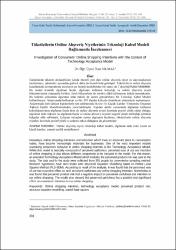| dc.contributor.author | Yılmaz, Özer | |
| dc.date.accessioned | 2019-06-11T07:15:08Z | |
| dc.date.available | 2019-06-11T07:15:08Z | |
| dc.date.issued | 2018 | en_US |
| dc.identifier.uri | https://dergipark.org.tr/download/article-file/606755 | |
| dc.identifier.uri | https://hdl.handle.net/11630/6450 | |
| dc.description | Nowadays, online shopping intentions and behaviors which have an important place in consumption
habits, have become increasingly important for businesses. One of the most important models
examining consumers' behavior in online shopping channels is the Technology Acceptance Model.
While this model is basically composed of perceived usefulness, perceived ease of use and intention
of online shopping, it also allows different components to be included in the model. For this reason,
an extended Technology Acceptance Model which includes the perceived product risk was used in the
study. The data used in the study were collected from 355 people by convenience sampling method.
Research hypotheses have been tested with Structural Equation Modelling based on Partial Least
Squares Method (PLS-SEM). According to result of the analysis, it was found that the perceived ease
of use had a positive effect on both perceived usefulness and online shopping intention. Nonetheless it
was found that perceived product risk had a negative impact on perceived usefulness and intention to
use online shopping. The results also showed that perceived usefulness has a positive and significant
effect on consumers’ intention to use online shopping. | en_US |
| dc.description.abstract | Günümüzde tüketim alışkanlıkları içinde önemli yeri olan online alışveriş niyet ve davranışlarının
incelenmesi, işletmeler açısından giderek daha da önemli hale gelmiştir. Tüketicilerin online alışveriş
kanallardaki davranışlarını inceleyen en önemli modellerden bir tanesi de Teknoloji Kabul Modelidir.
Bu model temelde algılanan fayda, algılanan kullanım kolaylığı ve online alışveriş niyeti
bileşenlerinden oluşmakla birlikte, farklı bileşenlerin de modele dâhil edilmesine imkân tanımaktadır.
Bu nedenle çalışmada algılanan ürün riskini de içeren genişletilmiş bir Teknoloji Kabul Modeli
kullanılmıştır. Araştırmada kullanılan veriler 355 kişiden kolayda örnekleme yöntemiyle toplanmıştır.
Araştırmada ileri sürülen hipotezlerin test edilmesinde Kısmi En Küçük Kareler Yöntemine Dayanan
Yapısal Eşitlik Modellemesinden yararlanılmıştır. Yapılan analiz sonucunda algılanan kullanım
kolaylığının hem algılanan fayda hem de online alışveriş niyeti üzerinde pozitif yönlü etkisi olduğu,
algılanan ürün riskinin ise algılanan fayda ve online alışveriş niyetini negatif yönde etkilediği yönünde
bulgular elde edilmiştir. Çalışma sonuçları ayrıca algılanan faydanın, tüketicilerin online alışveriş
niyetleri üzerinde pozitif yönlü ve anlamlı etkisi olduğunu da göstermiştir. | en_US |
| dc.language.iso | tur | en_US |
| dc.publisher | Afyon Kocatepe Üniversitesi | en_US |
| dc.identifier.doi | 10.32709/akusosbil.478718 | en_US |
| dc.rights | info:eu-repo/semantics/openAccess | en_US |
| dc.subject | Online alışveriş niyeti, teknoloji kabul modeli, algılanan ürün riski, kısmi en küçük kareler, yapısal eşitlik modellemesi | en_US |
| dc.title | Tüketicilerin Online Alışveriş Niyetlerinin Teknoloji Kabul Modeli Bağlamında İncelenmesi | en_US |
| dc.title.alternative | Investigation of Consumers' Online Shopping Intentions with the Context of Technology Acceptance Model | en_US |
| dc.type | article | en_US |
| dc.relation.journal | Sosyal Bilimler Dergisi | en_US |
| dc.department | Afyon Kocatepe Üniversitesi | en_US |
| dc.authorid | 0000-0002-8207-8682 | en_US |
| dc.identifier.volume | 20 | en_US |
| dc.identifier.startpage | 331 | en_US |
| dc.identifier.endpage | 346 | en_US |
| dc.identifier.issue | 3 | en_US |
| dc.relation.publicationcategory | Makale - Uluslararası Hakemli Dergi - Kurum Öğretim Elemanı | en_US |



















